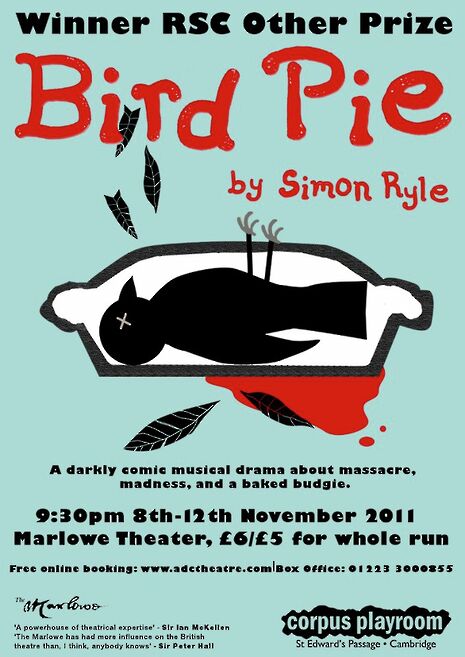Interview: John Kinsella
Theatre critic and playwright John Kinsella talks to Mairin O’Hagan and Andy Brock about misogyny, the role of the audience, and Anarchic freedom in contemporary student theatre
John Kinsella would not describe himself as a “Theatre Person”, which is odd considering the various roles he has adopted as a theatre critic, playwright and most recently as the Judith E Wilson Visiting Fellowship - a position established to draw live performance and the University together. He is, however, “a poet with a great passion for theatre” particularly the way “language transforms space.” His role, as he sees it, is looking at the relationship between “the writing process and what might eventually happen on stage.”
Kinsella is excited to be returning to Cambridge – what he calls his ‘Other Place’ - a world away from his home deep in the West Australian bush. Speaking of the Cambridge Drama scene as “a liminal space between the student and the professional world”, he also sees it as a place where students who are studying the arts and learning to be critics can and should respond to a creative impulse. Studying should be an enabling process, and for Kinsella, academic study and creative output go hand in hand. “My critical practice is part of my poetics,” he states, “I’ve never been able to separate the two.” This is evident in his tendency to describe himself in clear critical terms - ‘Anarchist’, ‘feminist’, ‘vegan’, ‘pacifist’, ‘profound anti-capitalist’, and ‘environmentalist’ –all labels that he assigns to himself with fervour. These terms define not just the content of his work, but the very processes used to create such content. As an Anarchist, Kinsella believes that no one person can claim ownership of a text. When he writes for the theatre, therefore, he leaves what he describes as “holes”, so that the director, actors and production team can take his text and shape it into a collaboratively realised work.

Despite labelling himself with these provocative terms, Kinsella does not see theatre as a forum for didactic sermonising but rather as a place where important issues can be tackled by presenting an alternative to the status-quo. This tendency to “show” rather than “tell” is manifest in his view of the way in which theatre should address the lack of roles for women in the majority of plays, a fact that has contributed to theatre becoming “one of the last refuges of unreconstructed misogyny.” Rather than writing plays that actively bemoan this inequality, Kinsella simply intends to write plays with more roles for women; a refreshing and powerful alternative to aggressive moralising.
The audience is not forgotten in amongst all this theatrical theorising, although Kinsella suggests that they needn’t always be at the forefront of a playwright’s mind. “What constitutes an audience is very complex thing… we shouldn’t ever tailor what we write to our preconception about what an audience might be.” In Kinsella’s opinion, one invites an audience to an event and they will choose either to participate or not.
Alongside fulfilling his various academic duties whilst in Cambridge – including organising a symposium on Poetic Collaboration in the spring - Kinsella is also looking forward to getting along to as many student productions as he can. Reluctant to highlight anything in particular he claims that he enjoys “almost all of it”. This is down to the fact that “unlike many universities, there are so many opportunities to put on plays, that students can have the space to take risks.” It is with this ethos in mind that Kinsella was involved in the creation of ‘The Other Prize’, The Marlowe Society’s award for new playwriting, judged by the literary manager of the Royal Shakespeare Company alongside the Marlowe’s senior treasurer, Tim Cribb. Kinsella is convinced that Prize is a great way to Segway into the professional industry, providing invaluable exposure for the winner’s work, as well as giving them a focused opportunity in which to develop their craft.
Despite his emphasis on process, Kinsella is still an artist who relishes outcomes and enjoys seeing work come to fruition, and he recognises that this can only happen through sheer hard-work. “Anything is possible in Cambridge” he says, “if you are willing to put the effort in.”
This year’s winner of the RSC/Other Prize, ‘Bird Pie’, will be performed on the 8th-12th November. For tickets visit www.corpusplayroom.com
 Features / Meet the Cambridge students whose names live up to their degree9 September 2025
Features / Meet the Cambridge students whose names live up to their degree9 September 2025 News / Trinity Street to close for month-long roadworks13 September 2025
News / Trinity Street to close for month-long roadworks13 September 2025 News / New NHS platform causes security concerns in Cambridge12 September 2025
News / New NHS platform causes security concerns in Cambridge12 September 2025 News / Tompkins Table 2025: Trinity widens gap on Christ’s19 August 2025
News / Tompkins Table 2025: Trinity widens gap on Christ’s19 August 2025 Comment / Cambridge South is right to be ambitious13 September 2025
Comment / Cambridge South is right to be ambitious13 September 2025









